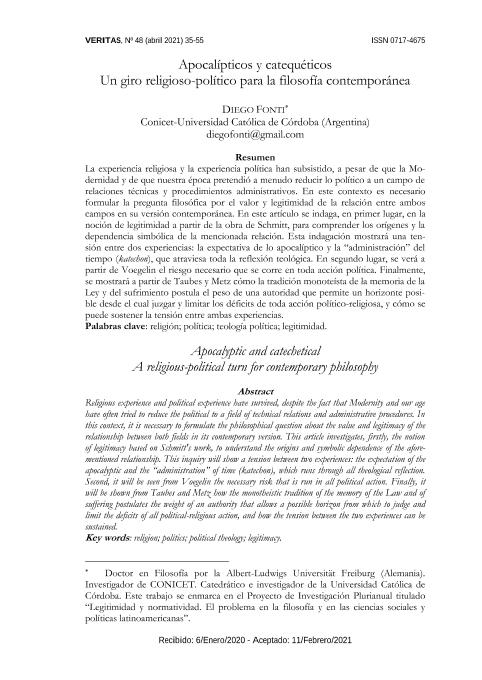Artículo
La experiencia religiosa y la experiencia política han subsistido, a pesar de que la Modernidad y de que nuestra época pretendió a menudo reducir lo político a un campo de relaciones técnicas y procedimientos administrativos. En este contexto es necesario formular la pregunta filosófica por el valor y legitimidad de la relación entre ambos campos en su versión contemporánea. En este artículo se indaga, en primer lugar, en la noción de legitimidad a partir de la obra de Schmitt, para comprender los orígenes y la dependencia simbólica de la mencionada relación. Esta indagación mostrará una tensión entre dos experiencias: la expectativa de lo apocalíptico y la “administración” del tiempo (katechon), que atraviesa toda la reflexión teológica. En segundo lugar, se verá a partir de Voegelin el riesgo necesario que se corre en toda acción política. Finalmente, se mostrará a partir de Taubes y Metz cómo la tradición monoteísta de la memoria de la Ley y del sufrimiento postula el peso de una autoridad que permite un horizonte posible desde el cual juzgar y limitar los déficits de toda acción político-religiosa, y cómo se puede sostener la tensión entre ambas experiencias. Religious experience and political experience have survived, despite the fact that Modernity and our age have often tried to reduce the political to a field of technical relations and administrative procedures. In this context, it is necessary to formulate the philosophical question about the value and legitimacy of the relationship between both fields in its contemporary version. This article investigates, firstly, the notion of legitimacy based on Schmitt's work, to understand the origins and symbolic dependence of the aforementioned relationship. This inquiry will show a tension between two experiences: the expectation of the apocalyptic and the “administration” of time (katechon), which runs through all theological reflection. Second, it will be seen from Voegelin the necessary risk that is run in all political action. Finally, it will be shown from Taubes and Metz how the monotheistic tradition of the memory of the Law and of suffering postulates the weight of an authority that allows a possible horizon from which to judge and limit the deficits of all political-religious action, and how the tension between the two experiences can be sustained
Apocalípticos y catequéticos: Un giro religioso-político para la filosofía contemporánea
Título:
Apocalyptic and catechetical: A religious-political turn for contemporary philosophy
Fecha de publicación:
04/2021
Editorial:
Pontificio Seminario Mayor San Rafael
Revista:
Veritas
ISSN:
0717-4675
e-ISSN:
0718-9273
Idioma:
Español
Tipo de recurso:
Artículo publicado
Clasificación temática:
Resumen
Palabras clave:
RELIGION
,
POLÍTICA
,
TEOLOGÍA POLÍTICA
,
LEGITIMIDAD
Archivos asociados
Licencia
Identificadores
Colecciones
Articulos(CCT - CORDOBA)
Articulos de CTRO.CIENTIFICO TECNOL.CONICET - CORDOBA
Articulos de CTRO.CIENTIFICO TECNOL.CONICET - CORDOBA
Citación
Fonti, Diego Osvaldo; Apocalípticos y catequéticos: Un giro religioso-político para la filosofía contemporánea; Pontificio Seminario Mayor San Rafael; Veritas; 48; 4-2021; 35-55
Compartir
Altmétricas




